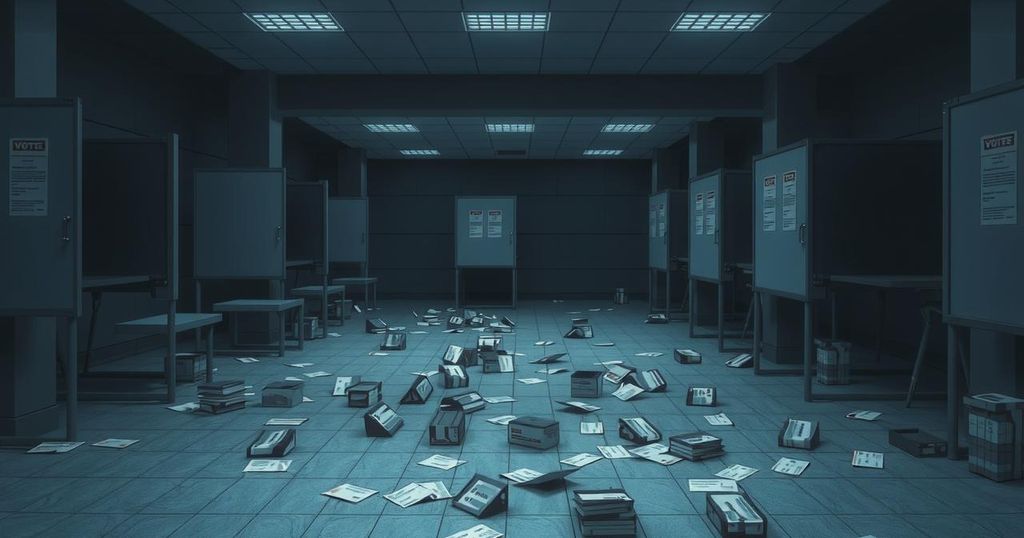Juan Pablo Guanipa Arrested Amid Rising Tensions Before Venezuelan Elections
Juan Pablo Guanipa, an opposition leader in Venezuela, was arrested for alleged conspiracy to sabotage upcoming elections. His arrest adds to rising tensions as the opposition plans to boycott the vote. Interior Minister Diosdado Cabello alleges Guanipa was involved in a foiled plot connected to foreign mercenaries, raising concerns over government repression. The U.S. has expressed dismay, highlighting fears for democracy in Venezuela.
In a significant development, Juan Pablo Guanipa, a prominent opposition leader in Venezuela, was arrested on Friday. Authorities charged him with conspiring to sabotage the upcoming parliamentary and regional elections planned for Sunday. This arrest comes amidst growing tensions as the opposition, led by fellow politician Maria Corina Machado, has announced its intention to boycott the vote. Guanipa, 60 years old and a former member of the National Assembly, is a close ally of Machado, who has urged voters to reject the elections.
The political situation has escalated, especially after the controversial July 2024 presidential election, where many believe opposition candidate Edmundo Gonzalez Urrutia legitimately won but was denied victory. Following this election, both Guanipa and Machado went into hiding. Interior Minister Diosdado Cabello stated that Guanipa’s arrest was connected to a thwarted conspiracy involving foreign mercenaries aiming to disrupt the elections.
Cabello, speaking on state television, described Guanipa as a key figure in what he termed a “terrorist network”. He asserted that authorities recovered four mobile phones and a laptop belonging to Guanipa, which allegedly contained detailed plans for attacks during the election period. Cabello claimed that these suspects planned to target hospitals, metro stations, police stations, and crucial infrastructure.
In addition to Guanipa, over 70 individuals were reportedly arrested in this bust, including foreign nationals from Ecuador, Argentina, Germany, Serbia, and a few from Pakistan. The U.S. Secretary of State Marco Rubio expressed grave concern regarding Guanipa’s arrest, labeling it an act of repression orchestrated by the Maduro administration.
Shortly after his arrest, Guanipa managed to send a message via social media, stating, “If you are reading this, it is because I have been kidnapped by the forces of Nicolas Maduro’s regime.” He expressed uncertainty about what the future holds for him but reaffirmed his commitment to the fight against the current regime.
In response to the arrest, Machado denounced the actions of Presiden Maduro as “STATE TERRORISM, pure and simple” and asserted that Guanipa serves as an inspiration for both citizens and fellow political leaders. Since Maduro’s leadership began, Venezuela’s economy has crumbled, leading millions to flee, primarily to neighboring Latin American countries.
As the elections loom, Maduro asserts that he has garnered victory in previous elections without presenting credible evidence to support such claims. The state prosecutor’s office accused Guanipa of participating in a “criminal organization” responsible for attempting to undermine both past and upcoming elections. Notably, Maduro, a successor of the late Hugo Chavez, often asserts that he faces threats from foreign-backed coup attempts.
Recent patterns show a routine of mass detentions of government critics, including the suspension of flights from Colombia following the arrest of alleged mercenaries crossing into Venezuela. Guanipa, who is also a trained lawyer, previously held the position of vice president in a parallel government established by former leader Juan Guaido after the disputed 2018 elections in which the opposition refused to participate due to the disqualification of leading candidates.
In summary, the arrest of Juan Pablo Guanipa highlights the escalating tensions in Venezuela ahead of the contentious elections this weekend. With the opposition boycotting the vote and accusations of government conspiracy prevalent, the political climate remains volatile. Guanipa’s arrest has drawn international concern, particularly regarding the treatment of political dissenters by the Maduro regime. As Venezuela navigates these troubled waters, the implications for democracy, human rights, and the future of opposition movements in the country are uncertain.
Original Source: www.france24.com




Post Comment